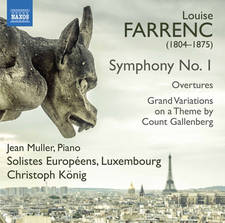The Full Works Concert: Thursday 19 February 2015, 8pm
In tonight's Hall of Fame concert, Catherine presents one of Mozart’s most famous and enduring works, and his second highest entry in the 2014 chart.
Shostakovich’s Jazz Suites – of which we'll hear the first tonight – have a sort of end-of-the-pier quality to them. This is deeply sugary music, created in direct response to the Soviet government’s demand that more be done to reflect this emerging genre. Did Shostakovich compose these suites in a deliberately tongue-in-cheek way? Or was he musically naive, limited by the Russian communists from the true sound of what he was meant to be emulating? We’ll never know for sure – but what we can be certain of is that these brilliant tunes still find an appreciative audience today.
In the spring of 1721, Bach was contemplating changing jobs and, after a chance meeting with the Margrave of Brandenburg, Bach sent him a set of six concertos that he had already written - possibly as a kind of audition. The Margrave appears to have completely ignored the gift and the set were discarded in his library until his death in 1734. They were found in the Brandenburg archives during the 19th century.
When the Count von Walsegg's wife Anna died on Valentine’s Day 1791, it set in motion a series of events that, one could argue, has never stopped. Walsegg, an accomplished musician himself, anonymously commissioned a Requiem from Mozart , totally spooking the already unstable composer in the process. Mozart became consumed by the work, believing he had been cursed to write a requiem for himself, because he was about to die. The opening movement was the only section to be completed. The rest of the Requiem was brushed into some sort of shape by Mozart’s only composition pupil, Süssmayr. Regardless, the Requiem still sounds wonderful to most ears.
It might have taken Brahms quite some time to write a symphony but once he had premiered No.1 in 1876, there really was no stopping him. By 1884, he was penning his fourth and final one. There’s an evergreen feeling to this symphony – an almost autumnal sound. Having struggled for so long to find his own authentic voice amid the noise that followed Beethoven’s death, Brahms sounds free here; musically liberated. Rich orchestral colours abound, and melody after melody flows right across the orchestra. The triumphant sound of the finale is impossible to avoid, with Brahms using every instrument of the orchestra to drive onwards to the most thunderous and joy-filled conclusion.
Dmitri Shostakovich: Jazz Suite No.1
Riccardo Chailly conducts the Royal Concertgebouw Orchestra
Johann Sebastian Bach: Brandenburg Concerto No.3 in G major
John Eliot Gardiner conducts the English Baroque Soloists
Wolfgang Amadeus Mozart: Requiem
Soprano: Emma Kirkby
Contralto: Carolyn Watkinson
Tenor: Anthony Rolfe-Johnson
David Thomas: Bass
Christopher Hogwood conducts the Chorus and Orchestra of the Academy of Ancient Music and Westminster Boys Choir
Johannes Brahms: Symphony No.4 in E minor
John Eliot Gardiner conducts the Orchestre Revolutionaire et Romantqiue











